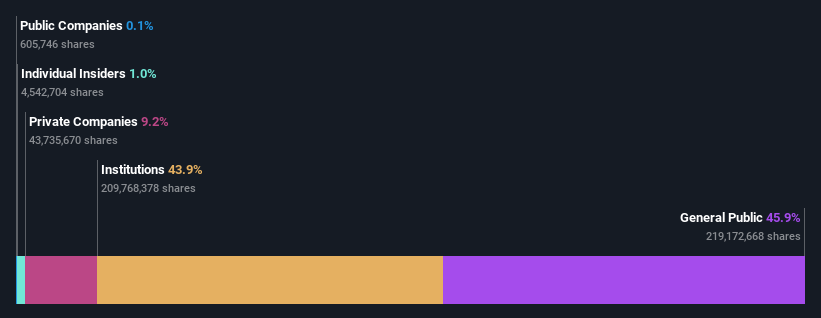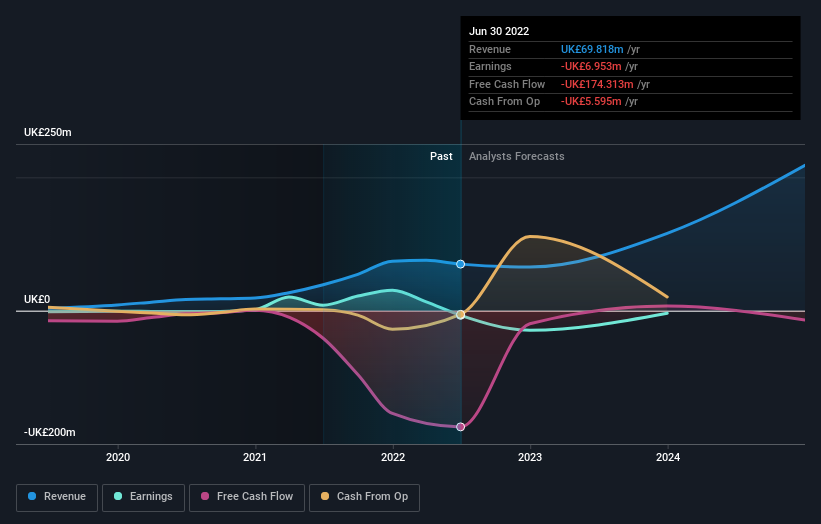Institutions profited after the market value of Argo Blockchain plc (LON:ARB) rose by £18m last week, but individual investors profited the most
A look at the shareholders of Argo Blockchain plc (LON:ARB) can tell us which group is the strongest. We can see that individual investors own the lion’s share of the company with a 46% stake. In other words, the group stands to gain the most (or lose the most) from its investment in the company.
After an 11% rise in the share price last week, individual investors profited the most, but institutions owning 44% of shares could also benefit from the increase.
Let’s dive deeper into each type of Argo Blockchain owner, starting with the chart below.
If you’re not interested in researching ARB’s ownership structure, we have one free list of interesting investment ideas that could potentially inspire your next investment!

What does the institutional ownership tell us about Argo Blockchain?
Institutions typically measure themselves against a benchmark when reporting to their own investors, so they often become more enthusiastic about a stock when it is included in a major index. We expect that most companies have some institutions in the register, especially if they are growing.
We can see that Argo Blockchain has institutional investors; and they have a good portion of the company’s shares. This may indicate that the company has a certain degree of credibility in the investment environment. However, it is best to be cautious about relying on the supposed validation that comes with institutional investors. They are also wrong sometimes. It is not unusual to see a large share price drop if two large institutional investors try to sell out of a stock at the same time. So it is worth checking the past earnings trajectory of Argo Blockchain, (below). Remember, of course, that there are other factors to consider as well.

We note that hedge funds do not have a meaningful investment in Argo Blockchain. First Investments Holding Ltd is today the largest shareholder, with 8.5% of the shares outstanding. In comparison, the second and third largest shareholders own around 5.3% and 4.7% of the shares.
A deeper look at our ownership data shows that the top 25 shareholders together hold less than half of the register, suggesting a large group of small owners where no single shareholder has a majority.
Examining institutional ownership is a good way to measure and filter a stock’s expected performance. The same can be achieved by studying the analysts’ emotions. Quite a few analysts cover the stock, so you can easily take a closer look at the forecast for growth.
Insider ownership of Argo Blockchain
The definition of an insider may vary somewhat between different countries, but board members always count. Management ultimately answers to the board. However, it is not uncommon for executives to be board members, especially if they are a founder or CEO.
Most people consider insider ownership to be positive because it can indicate that the board is well aligned with other shareholders. But on some occasions too much power is concentrated in this group.
Our data suggests that insiders own less than 1% of Argo Blockchain plc in their own names. However, it is possible that insiders may have an indirect interest through a more complex structure. It appears the directors hold no more than £1.7m of shares in the £178m UK company. Many people tend to prefer to see a board with larger shareholdings. A good next step might be to take a look at this free summary of insider buying and selling.
General public ownership
With an ownership of 46%, the general public, mainly consisting of individual investors, has a degree of influence over Argo Blockchain. Although this size of ownership may not be enough to influence a political decision in their favor, they can still have a collective impact on the company’s policies.
Private company ownership
We can see that Private Companies own 9.2% of the shares that have been issued. It’s hard to draw any conclusions from this fact alone, so it’s worth looking at who owns these private companies. Sometimes insiders or other related parties have interests in shares in a public company through a separate private company.
Next step:
It is always worth thinking about the different groups that own shares in a company. But to understand Argo Blockchain better, we need to consider many other factors. Take risk for example – Argo Blockchain has 3 warning signs (and 2 that cannot be ignored) we think you should know about.
Ultimately the future is most important. You can access this free report on analyst forecasts for the company.
NB: Figures in this article have been calculated using data from the last twelve months, which refers to the 12-month period ending on the last date of the month in which the accounts are dated. This may not be consistent with the annual report for the entire year.
Do you have feedback on this article? Worried about the content? Contact with us directly. Alternatively, you can email the editors (at) simplywallst.com.
This article by Simply Wall St is general. We provide commentary based on historical data and analyst forecasts only using an objective methodology, and our articles are not intended to be financial advice. It does not constitute a recommendation to buy or sell shares, and does not take into account your goals or your financial situation. We aim to provide you with long-term focused analysis driven by fundamental data. Please note that our analysis may not take into account the latest price-sensitive company announcements or qualitative material. Simply Wall St has no position in any of the stocks mentioned.
Valuation is complex, but we help make it simple.
Find out if Argo Blockchain is potentially overvalued or undervalued by checking out our comprehensive analysis, which includes fair value estimates, risks and warnings, dividends, insider trading and financial health.
See the free analysis

